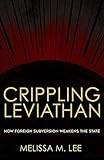Crippling Leviathan : How Foreign Subversion Weakens the State / Melissa M. Lee.
Material type: TextPublisher: Ithaca, NY : Cornell University Press, [2020]Copyright date: ©2021Description: 1 online resource (264 p.) : 12 maps, 17 chartsContent type:
TextPublisher: Ithaca, NY : Cornell University Press, [2020]Copyright date: ©2021Description: 1 online resource (264 p.) : 12 maps, 17 chartsContent type: - 9781501748363
- 9781501748387
- Authority
- International relations
- Legitimacy of governments
- Political stability
- Sovereignty, Violation of
- State, The
- Subversive activities
- Asian Studies
- International Studies
- Political Science & Political History
- POLITICAL SCIENCE / World / Asian
- Statebuilding, Political development, State capacity, Foreign Intervention, Subversion, State Development
- 327.12 23
- JC330.2 .L43 2020
- online - DeGruyter
| Item type | Current library | Call number | URL | Status | Notes | Barcode | |
|---|---|---|---|---|---|---|---|
 eBook
eBook
|
Biblioteca "Angelicum" Pont. Univ. S.Tommaso d'Aquino Nuvola online | online - DeGruyter (Browse shelf(Opens below)) | Online access | Not for loan (Accesso limitato) | Accesso per gli utenti autorizzati / Access for authorized users | (dgr)9781501748387 |
Frontmatter -- Contents -- Acknowledgments -- Introduction: The International Dimensions of State Weakness -- 1. The State of State Authority -- 2. The Strategy of Foreign Subversion -- 3. Hostile Neighbors, Weak Peripheries -- 4. The Roots of Subversion -- 5. Undermining State Authority in the Philippines -- 6. Undermining State Authority in Cambodia -- Conclusion: The Leviathan, Crippled -- Appendix: Data and Statistics -- Notes -- References -- Author Index -- Subject Index
restricted access online access with authorization star
http://purl.org/coar/access_right/c_16ec
Policymakers worry that "ungoverned spaces" pose dangers to security and development. Why do such spaces exist beyond the authority of the state? Earlier scholarship—which addressed this question with a list of domestic failures—overlooked the crucial role that international politics play. In this shrewd book, Melissa M. Lee argues that foreign subversion undermines state authority and promotes ungoverned space. Enemy governments empower insurgents to destabilize the state and create ungoverned territory. This kind of foreign subversion is a powerful instrument of modern statecraft. But though subversion is less visible and less costly than conventional force, it has insidious effects on governance in the target state. To demonstrate the harmful consequences of foreign subversion for state authority, Crippling Leviathan marshals a wealth of evidence and presents in-depth studies of Russia's relations with the post-Soviet states, Malaysian subversion of the Philippines in the 1970s, and Thai subversion of Vietnamese-occupied Cambodia in the 1980s. The evidence presented by Lee is persuasive: foreign subversion weakens the state. She challenges the conventional wisdom on statebuilding, which has long held that conflict promotes the development of strong, territorially consolidated states. Lee argues instead that conflictual international politics prevents state development and degrades state authority. In addition, Crippling Leviathan illuminates the use of subversion as an underappreciated and important feature of modern statecraft. Rather than resort to war, states resort to subversion. Policymakers interested in ameliorating the consequences of ungoverned space must recognize the international roots that sustain weak statehood.
Mode of access: Internet via World Wide Web.
In English.
Description based on online resource; title from PDF title page (publisher's Web site, viewed 01. Dez 2022)


